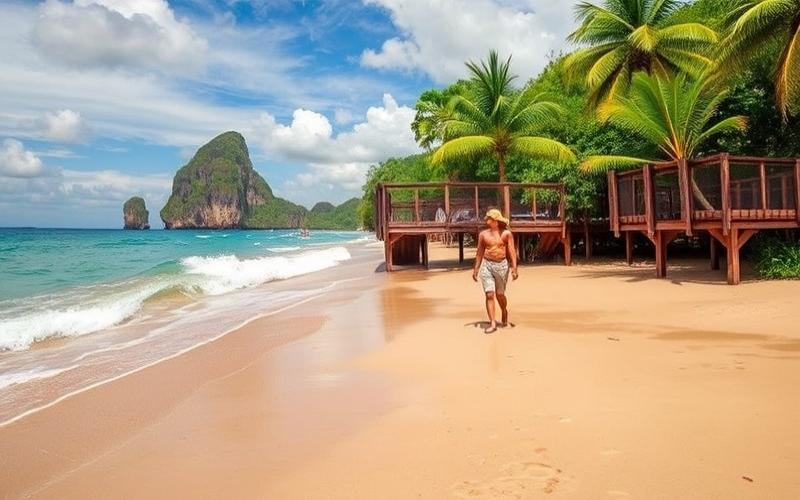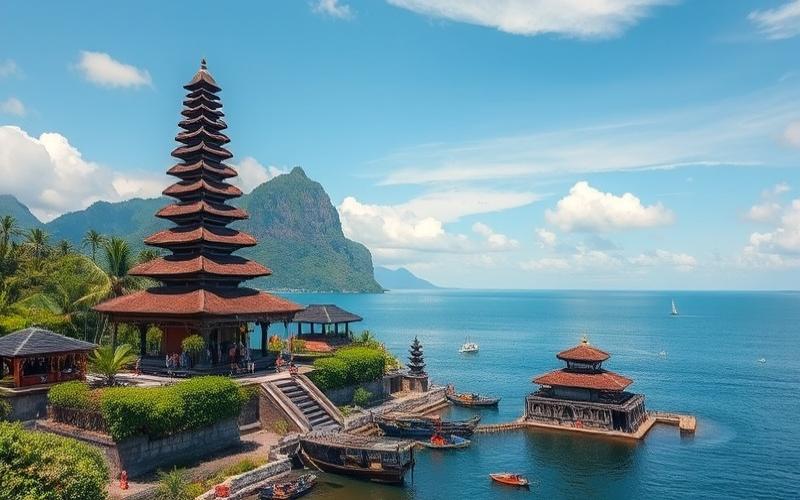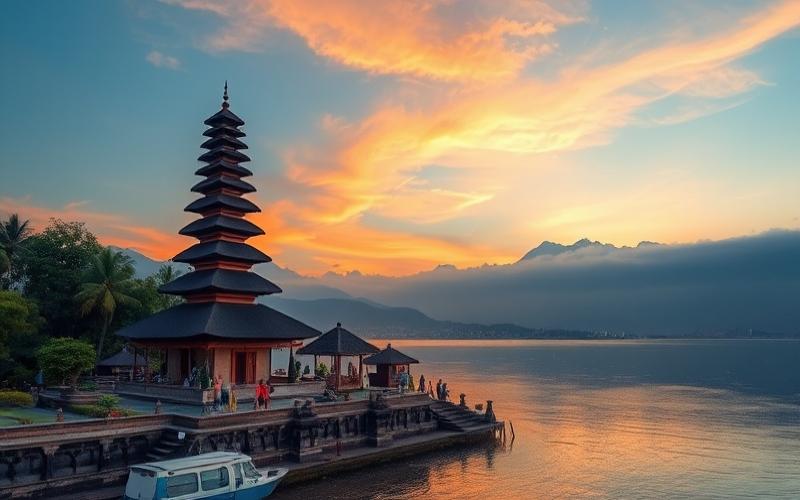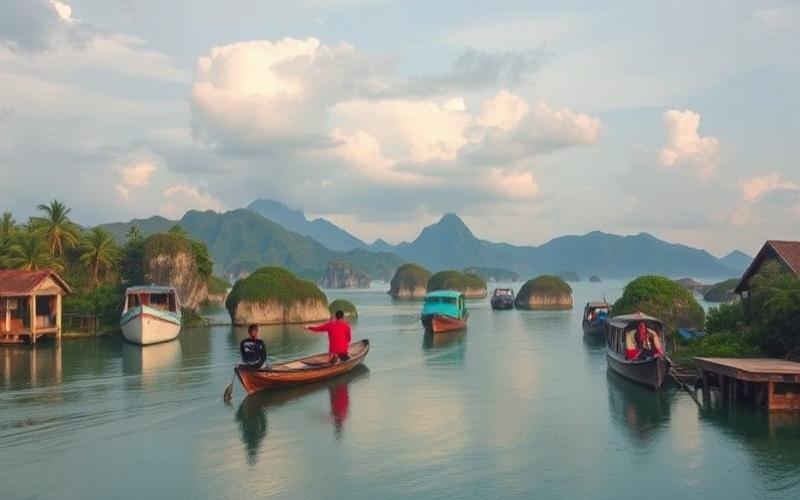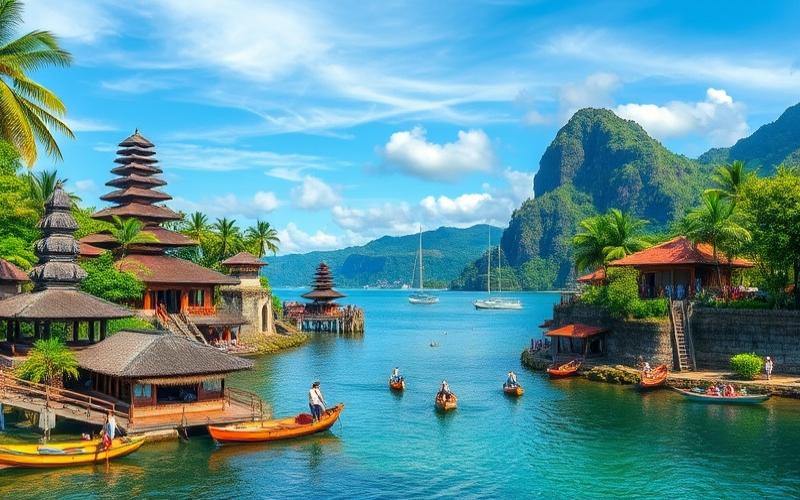
 Published on and written by Cyril Jarnias
Published on and written by Cyril Jarnias
Finding housing in Indonesia can be an adventure as exciting as it is complex, given this archipelago’s wealth of varied landscapes and captivating cultures.
Whether you’re looking for a beachfront villa in Bali, a modern apartment in Jakarta, or a traditional Javanese house, it’s essential to effectively navigate the nuances of the local real estate market.
This article reveals practical and essential tips to help you avoid common pitfalls, negotiate rents confidently, and find great deals.
Discover how to integrate local customs, understand current regulations, and use online platforms to optimize your search and make your move to Indonesia a success.
Finding Housing in Indonesia: Keys to Success
Recommended Main Platforms and Real Estate Agencies
- Bali Home Immo: Known for its reliability, professionalism, and wide catalog of properties in Bali and other regions of Indonesia.
- Kibarer Property: Specializes in villas and luxury properties, includes legal assistance.
- MIO & PARTNERS: Tailored advice for expatriates and investors, strong local market expertise.
- World Estate Homes: Wide selection of properties throughout Indonesia, comprehensive support, including document verification.
- Other Mentioned Agencies: Bali Immobilier, Invest Bali, Invest Islands, Cuan Bali Land, Century 21 United, Bali Property Exchange, Bali Treasure Properties.
You’ll also find general platforms like Rumah123, FazWaz (over 44,000 listings), or Goplaceit, making it easier to compare offers.
Comparison Table: Platforms/Agencies and Specifics
| Platform/Agency | Specialty | Geographic Area | Additional Services |
|---|---|---|---|
| Bali Home Immo | Villas, houses, land | Bali, Lombok, Gili… | Support, valuation, AREBI network |
| Kibarer Property | Luxury, investment | Bali | Legal advisors/notaries |
| MIO & PARTNERS | Personalized consultation | Bali, Jakarta | Expat expertise, full management |
| World Estate Homes | Various properties, reliable developers | All Indonesia | Personalized follow-up, lawyer verification |
| FazWaz, Rumah123, Goplaceit | Various properties (apartments, villas…) | All Indonesia | Advanced search, comparator |
Differences Between Urban and Rural Housing
- Urban (Jakarta, Bali, Surabaya…)
- Wide choice of apartments, modern houses, serviced villas, secure complexes.
- Proximity to transportation, international schools, shops, and medical centers.
- Higher rents, strong competition, more demanding guarantee requirements.
- Rural (villages, small islands, less touristy areas)
- Limited supply, often traditional or modest houses.
- Few services, sometimes basic infrastructure.
- Affordable rents, easier negotiation, fewer formalities.
Temporary Housing for Initial Settlement
- Hotels, hostels, guesthouses (plentiful in tourist areas).
- Furnished apartments or co-living (short-term rental, all-inclusive solutions).
- Monthly rentals via Airbnb or local platforms.
Factors to Consider During Your Search
- Budget: Consider rent, utilities, security deposit (often 1 to 3 months), agency fees, and additional expenses (internet, electricity).
- Location: Proximity to workplace, schools, shops, medical centers, entertainment.
- Transportation: Accessibility by scooter, car, or public transport; sometimes heavy traffic.
- Amenities: Access to drinking water, internet, air conditioning, furniture.
- Safety: Quiet neighborhood, security presence, area reputation.
List of Key Points to Check Before Committing
- Condition of the property (humidity, plumbing, electricity).
- Written lease agreement, ideally in English or translated.
- Lease duration, renewal conditions.
- Payment methods and security deposit procedures.
- Rules regarding pets, subletting, maintenance.
- Early termination clause.
Tips for Negotiation and Understanding Contracts
- Compare several similar offers to assess negotiation room.
- Negotiate not only rent but also lease duration, included utilities, repair responsibilities.
- Request an English version of the contract or use a local translator.
- Verify property rights and lease legality, especially for long-term rentals or purchases.
- Prefer recognized or recommended agencies to avoid scams.
Testimonials and Anecdotes
“We found exactly what we were looking for thanks to the agency’s support. The organization of the viewing, negotiation, and document verification with a lawyer made the transaction smooth. A real plus to avoid unpleasant surprises.”
“I used Kibarer Property twice to find a villa in Bali. The agents were very attentive and good negotiators, which helped me get a favorable rent and flexible conditions.”
“Upon arriving in Jakarta, I first rented a furnished apartment monthly, then took time to visit different neighborhoods before signing a long-term lease. This flexibility was invaluable for making the right choice.”
Key Takeaway:
Structure your approach, prioritize recommended agencies, take time to compare, and read contracts carefully. Negotiation is part of the local culture, but caution is advised to secure your settlement.
Good to Know:
Consider platforms like Rumah123 and UrbanIndo for your search, and prioritize safe neighborhoods with access to transportation; when negotiating rent, know that it’s common to reach an agreement directly with the owner.
Calculating Your Housing Budget in Indonesia
Types of Housing Available in Indonesia
- Apartments: Generally located in major cities like Jakarta, Denpasar, or Surabaya, ranging from studios to 4+ bedrooms. Suitable for expatriates and young professionals.
- Villas: Very common in Bali and tourist areas, often with pool and garden, ideal for families or groups.
- Traditional Houses: Called “rumah adat,” typical in villages or rural areas, built from wood or bamboo, less expensive.
- Homestays and Co-living: Economical solutions for students, travelers, or digital nomads, often shared housing with included services.
- Micro-apartments: New trend in Bali for small budgets, optimized spaces and reduced rents.
Cost Analysis for Purchase or Rental
| Location | 1-Bedroom Apartment/Month | 2-Bedroom Villa/Month | Local House/Month | Shared Housing/Month |
|---|---|---|---|---|
| Jakarta | 6M–15M IDR (370–925 €) | 10M–25M IDR (615–1,540 €) | 4M–8M IDR (245–490 €) | 2M–5M IDR (123–310 €) |
| Bali (Canggu) | 10M–20M IDR (615–1,230 €) | 15M–25M IDR (925–1,540 €) | 7,700,000 IDR (400 €) | 5,700,000 IDR (300 €) |
| Bali (Ubud) | 6M–12M IDR (370–740 €) | 10M–20M IDR (615–1,230 €) | 4,800,000 IDR (250 €) | 3,850,000 IDR (200 €) |
| Rural Bali Areas | 2M–5M IDR (123–310 €) | 6M–12M IDR (370–740 €) | 3M–6M IDR (185–370 €) | 1.5M–3M IDR (92–185 €) |
Table of Essential Neighborhoods for Expatriates in Indonesia
| City | Neighborhood | Unique Characteristics | Amenities & Transportation | Cost of Living | Expat Community |
|---|---|---|---|---|---|
| Jakarta | Kemang | Nightlife, upscale residential, pedestrian traffic, playgrounds, supermarkets, proximity to int. schools | Well-served, near main routes, private transport preferred | High | Very present, many clubs and networks |
| Jakarta | Menteng | Historic district, lively markets (Jalan Surabaya), elegant residences, proximity to embassies | Metro, taxis, easy access to malls and markets | Very High | Strong, cosmopolitan |
| Jakarta | Cipete | French school area, family atmosphere, walkable school access, playgrounds | Near schools, private transport | Medium to High | Numerous, French-speaking families |
| Jakarta | Pondok Indah | Luxury villas, shopping centers, modern infrastructure, enhanced security | Very well-served, easy access | Very High | Numerous, affluent families |
| Bali | Seminyak | Beach proximity, nightlife, international restaurants, boutiques, villas with pools | Scooters, taxis, easy access | High | Cosmopolitan, digital nomads |
| Bali | Canggu | Surf vibe, coworking, cafes, green spaces, modern villas, cultural life | Scooters, taxis, shuttles | Medium to High | Young community, entrepreneurs |
| Bali | Ubud | Cultural life, yoga, green spaces, tranquility, traditional and modern housing | Limited access, taxis, shuttles | Medium | Strong, artistic and holistic profiles |
| Bali | Sanur | Calm beaches, family atmosphere, spacious housing, proximity to international schools | Scooters, taxis, shuttles | Medium to High | Present, expatriate families |
| Surabaya | Darmo | Modern neighborhood, access to shops, international schools, green spaces, spacious housing | Well-served, quick access to malls | Medium to High | Significant, families and foreign professionals |
| Surabaya | Citraland | Nicknamed “Surabaya’s Singapore,” luxury properties, security, high-end infrastructure | Easy access, enhanced security | High | Affluent and international community |
| Surabaya | Graha Famili | Family homes, residential towers, golf courses, residential atmosphere | Easy access, near schools | High | Numerous, high-income profiles |
Main Characteristics of Sought-After Neighborhoods
- Enhanced Security: Presence of guards, barriers, video surveillance, gated communities.
- Proximity to International Schools: Fundamental criterion for families, especially in Jakarta, Bali, and Surabaya.
- Access to Green Spaces and Recreation: Parks, golf courses, playgrounds, sports clubs highly valued.
- Modern Amenities: International supermarkets, shopping centers, restaurants, private clinics.
- Varied Housing Options: Villas, modern serviced apartments, single-family homes, shared housing for young professionals.
- Transportation: Easy access to main routes, availability of taxis, scooters, private shuttles. Public transport often limited or impractical.
Tips for Choosing Your Neighborhood Based on Personal Needs
- For Families: Check proximity to international schools, green spaces, recreation centers, and neighborhood safety.
- For Young Professionals and Digital Nomads: Prioritize dynamic neighborhoods with coworking, nightlife, and easy access to cafes (e.g., Canggu, Seminyak).
- For Cultural Profiles: Choose neighborhoods offering rich cultural life and artistic activities (e.g., Ubud).
- For Tight Budgets: Consider peripheral neighborhoods, shared housing, or “kost” type accommodations (room in guesthouse).
Essential Points to Consider When Choosing a Neighborhood
- Safety: Prefer neighborhoods with controlled access, police presence or private security, especially in large cities.
- Infrastructure: Road quality, access to drinking water, reliability of electricity and internet, importance of transport network.
- Expatriate Community: Existence of support networks, social groups, organized activities, facilitating integration and daily life.
- Natural Risks: Avoid flood-prone areas, inquire about proximity to hospitals and emergency centers.
- Cost of Living: The most sought-after neighborhoods are generally more expensive, both for housing and daily services.
List of Amenities to Check Before Moving In
- International schools within 20 minutes
- Medical centers and hospitals quickly accessible
- Supermarkets and shops suited to expatriates
- Green spaces and sports facilities
- Access to high-speed internet
- Neighborhood safety (presence of guards, cameras)
- Convenient transport network (taxis, shuttles, metro)
- Expatriate clubs and social networks
Importance of Safety and Infrastructure
Safety and infrastructure quality are the main factors driving neighborhood popularity among expatriates. Neighborhoods offering enhanced security, reliable access to essential services (water, electricity, internet), and good transport connectivity are systematically preferred. This ensures not only daily comfort but also peace of mind, especially for families and long-term residents.
A well-secured neighborhood with modern infrastructure naturally attracts an international community and ensures easier integration, a comfortable lifestyle, and property value appreciation.
Key Takeaway: neighborhood choice depends primarily on individual priorities—family, work, leisure, budget—and objective criteria of safety, infrastructure, and community.
Good to Know:
In Jakarta, Kemang attracts for its international schools and vibrant community, while in Bali, Seminyak is prized for its beaches and easy access to modern amenities. In Surabaya, expatriates and locals appreciate Citraland for its security and green spaces, though it’s essential to consider transport proximity when choosing the right neighborhood.
Disclaimer: The information provided on this website is for informational purposes only and does not constitute financial, legal, or professional advice. We encourage you to consult qualified experts before making any investment, real estate, or expatriation decisions. Although we strive to maintain up-to-date and accurate information, we do not guarantee the completeness, accuracy, or timeliness of the proposed content. As investment and expatriation involve risks, we disclaim any liability for potential losses or damages arising from the use of this site. Your use of this site confirms your acceptance of these terms and your understanding of the associated risks.





